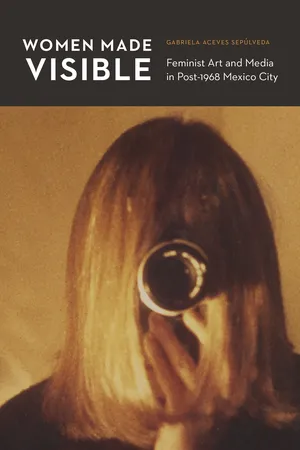
Women Made Visible
Feminist Art and Media in Post-1968 Mexico City
- 420 pages
- English
- ePUB (mobile friendly)
- Available on iOS & Android
About This Book
2020Canadian Association for Latin American and Caribbean Studies (CALACS) Book Prize In post-1968 Mexico a group of artistsand feminist activists began to question how feminine bodies were visually constructed and politicized across media. Participation of women was increasing in the public sphere, and the exclusive emphasis on written culture was giving way to audio-visual communications. Motivated by a desire for self-representation both visually and in politics, female artists and activiststransformedexisting regimes of media and visuality. Women Made Visible by Gabriela Aceves Sepúlveda uses a transnational and interdisciplinary lens to analyzethe fundamental and overlooked role played by artists and feminist activists in changing the ways female bodies were viewed and appropriated. Through their concern for self-representation (both visually and in formal politics), these women played a crucial role in transforming existing regimes of media and visuality—increasingly important intellectual spheres of action. Foregrounding the work of female artists and their performative and visual, rather than written, interventions in urban space in Mexico City, Aceves Sepúlveda demonstrates that these women feminized Mexico's mediascapes and shaped the debates over the female body, gender difference, and sexual violence during the last decades of the twentieth century. Weaving together the practices of activists, filmmakers, visual artists, videographers, and photographers, Women Made Visible questions the disciplinary boundaries that have historically undermined the practices of female artists and activists and locates the development of Mexican second-wave feminism as a meaningful actor in the contested political spaces of the era, both in Mexico City and internationally.
Frequently asked questions
Information
Table of contents
- Cover
- Series Page
- Title Page
- Copyright Page
- Dedication
- Contents
- List of Illustrations
- Acknowledgments
- List of Abbreviations
- Introduction
- Part 1
- 1. The Official City
- 2. The Media City
- 3. The Embodied City
- Part 2
- 4. The Archival and Political Awakenings of Ana Victoria Jiménez
- 5. Secret Documents and Feminist Practices
- 6. Performing Feminist Art
- Part 3
- 7. Interrupting Photographic Traditions
- 8. Feminist Collaborations in 1970s Mexico
- 9. POLArizing the Archive
- Conclusion
- Notes
- Bibliography
- Index
- About Gabriela Aceves Sepúlveda
- Series List